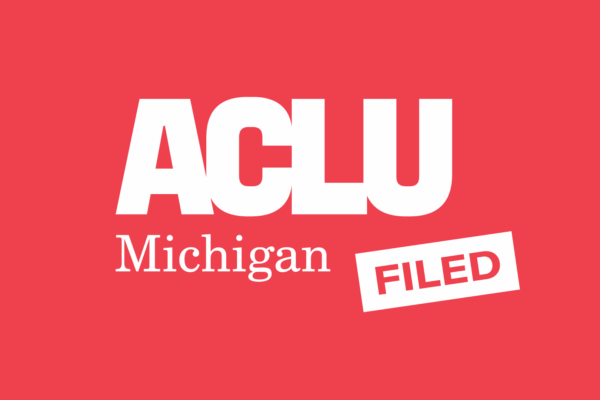Today’s court filing is part of a case expected to be heard before the Michigan Supreme Court in 2022
FOR IMMEDIATE RELEASE
DETROIT – Today the American Civil Liberties Union of Michigan (ACLU), along with a civil rights coalition of 20 legal, advocacy, and social service organizations, filed a friend-of-the-court brief in the Michigan Supreme Court arguing that the state’s civil rights law, known as the Elliott-Larsen Civil Rights Act (ELCRA), protects LGBT people from discrimination.
The case before the court, Rouch World LLC v. Michigan Department of Civil Rights (MDCR), was originally filed by two for-profit companies that refuse to provide services to LGBT customers and do not recognize MDCR’s legal authority to enforce ELCRA against them. Rouch World, which rents out property for events in Sturgis, discriminated against a lesbian couple when it refused to allow the couple to hold their wedding at the site. Another company, Uprooted Electrolysis, refuses to provide services to people who are transgender. The ACLU and civil rights coalition are supporting the MDCR’s argument that ELCRA, by prohibiting discrimination based on “sex,” protects LGBT people from discrimination based on sexual orientation and gender identity.
The ACLU and civil rights coalition’s brief urges the Michigan Supreme Court to follow the reasoning of the landmark case, Bostock v. Clayton County, Georgia, in which the U.S. Supreme Court ruled last year that under the federal Civil Rights Act of 1964 people are protected from discrimination based on their sexual orientation and gender identity. Bostock was heard jointly with the case of ACLU client and Metro Detroit transgender woman Aimee Stephens, who successfully challenged her firing from a Michigan funeral home because of her gender identity. Although the U.S. Supreme Court’s Bostock ruling ensures that people who belong to the LGBTQ community are protected from discrimination under federal law, a similar ruling in Rouch World has the potential to provide even greater protections under state law.
Jay Kaplan, ACLU of Michigan LGBT Rights Project Staff Attorney, issued this statement:
“Our late friend and client Aimee Stephens bravely fought against the discrimination she faced for being transgender so that others like her could live their authentic lives and free from discrimination. The time is now for the Michigan Supreme Court to affirm what Aimee made possible and hold that our state civil rights law protects all LGBTQ people from discrimination. We need to guarantee beyond any doubt that our state’s civil rights laws provide protections for LGBTQ people that are every bit as strong as their federal counterparts.”
The brief filed by the ACLU today, authored by ACLU of Michigan cooperating attorneys Leah Litman and Dan Deacon, was joined by the National ACLU as well as the following civil rights coalition members: Affirmations LGBTQ+ Community Center, Anti-Defamation League, Equality Michigan, Freedom for All Americans, Gender Identity Network Alliance, GLBTQ Legal Advocates & Defenders, Human Rights Campaign, Lambda Legal Defense & Educational Fund, Inc., LGBT Detroit, Michigan Unitarian Universalist Social Justice Network, National Center for Lesbian Rights, Out Center of Southwest Michigan, Out Front Kalamazoo, Pride At Work Michigan, Ruth Ellis Center, SAGE Metro Detroit, Southern Poverty Law Center, Stand With Trans, and Trans Sistas of Color Project.
The Michigan Supreme Court has not yet set a date for oral argument.
###
Stay Informed
Sign up to be the first to hear about how to take action.
By completing this form, I agree to receive occasional emails per the terms of the ACLU’s privacy statement.
By completing this form, I agree to receive occasional emails per the terms of the ACLU’s privacy statement.

